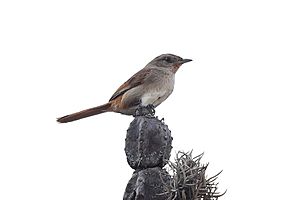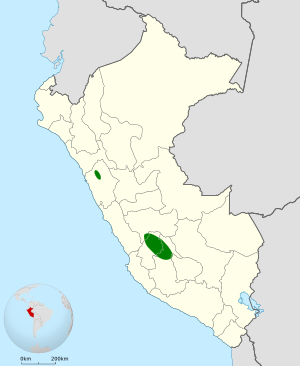Pale-tailed canastero facts for kids
Quick facts for kids Pale-tailed canastero |
|
|---|---|
 |
|
| Conservation status | |
| Scientific classification |
|
| Kingdom: | Animalia |
| Phylum: | Chordata |
| Class: | Aves |
| Order: | Passeriformes |
| Family: | Furnariidae |
| Genus: | Asthenes |
| Species: |
A. huancavelicae
|
| Binomial name | |
| Asthenes huancavelicae Morrison, 1938
|
|
 |
|
| Script error: The function "autoWithCaption" does not exist. | |
| Synonyms | |
|
|
Script error: No such module "Check for conflicting parameters".
The pale-tailed canastero (Asthenes huancavelicae) is a small bird that lives in South America. You can find it in the central and southern parts of Peru. This bird is part of the Furnariidae family, which includes many types of ovenbirds and foliage-gleaners.
Contents
About the Pale-tailed Canastero
The pale-tailed canastero is known for its unique appearance. It has a pale tail, which gives it its name. These birds are usually found in specific habitats. They prefer areas with shrubs and bushes.
What is Taxonomy?
When scientists study animals, they use something called taxonomy. This is how they classify and name living things. The pale-tailed canastero was first described in 1938 by a scientist named Alastair Morrison.
Some experts used to think the pale-tailed canastero was just a type of rusty-vented canastero. But now, many agree it's its own special species. You might also hear this bird called the Huancavelica canastero or the white-tailed canastero.
Different Types of Pale-tailed Canasteros
Within the pale-tailed canastero species, there are two main groups called subspecies. Think of subspecies as slightly different versions of the same animal. They might live in different places or have small differences in their looks.
The two recognized subspecies are:
- Asthenes huancavelicae usheri: This group lives in the Apurimac area of south-central Peru. Sadly, this subspecies is considered vulnerable. This means its population is decreasing, and it could be at risk if we don't protect its home.
- Asthenes huancavelicae huancavelicae: This group is found in several regions of Peru, including Ancash, Huancavelica, and Ayacucho. These areas are in western and south-central Peru.
Where They Live
The pale-tailed canastero lives only in Peru. Its natural home is in the Andes mountains. These birds prefer high-altitude areas. They can be found in dry, shrubby habitats. Protecting these areas is important for their survival.
See also
- In Spanish: Canastero de Huancavelica para niños
 | Claudette Colvin |
 | Myrlie Evers-Williams |
 | Alberta Odell Jones |


